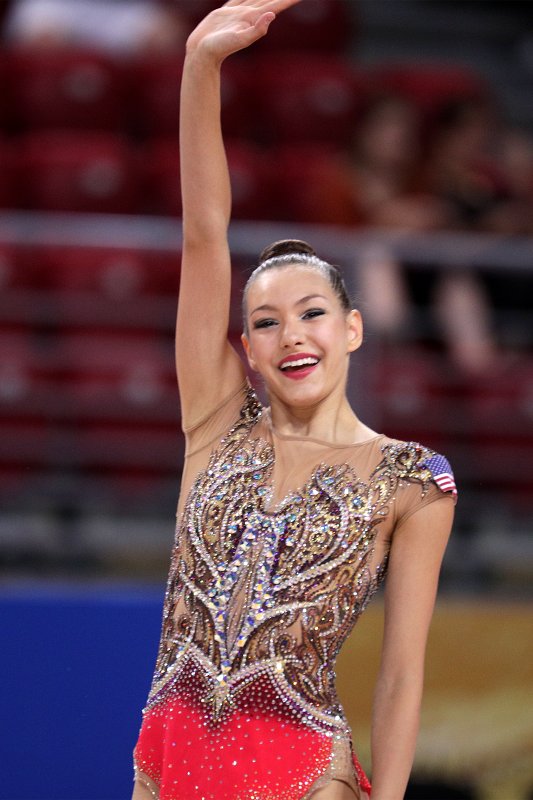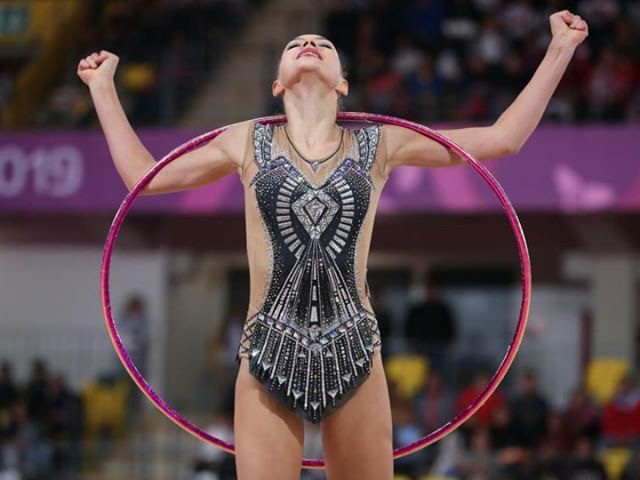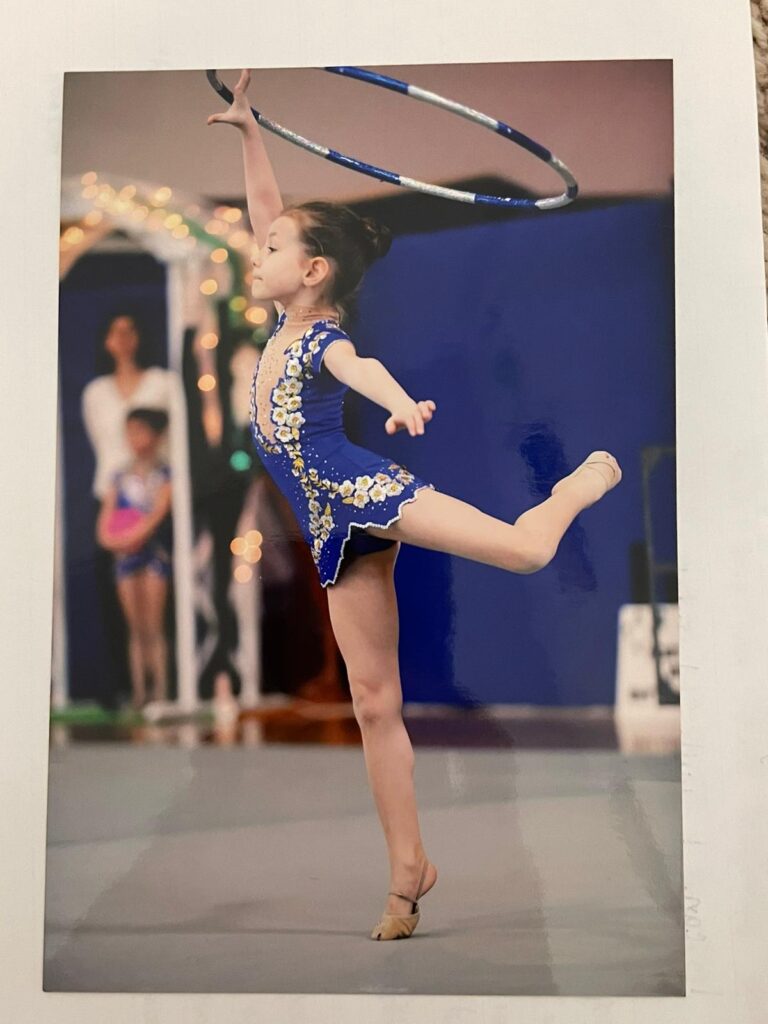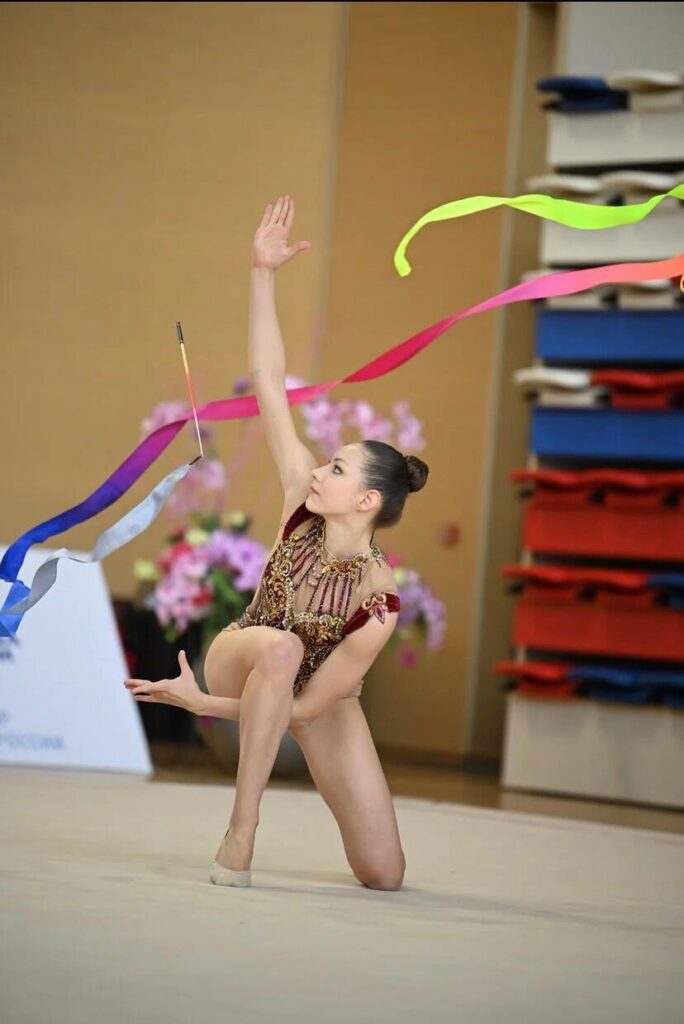Evita Griskenas is an American rhythmic gymnast. She was the 2019 Pan American Games Champion and placed eighth at the 2019 World Championships, earning a ticket to the Tokyo Olympic Games. In less than one month, she will be making her Olympic debut. On top of all that, she is currently a full-time student at Columbia University and will begin her sophomore year of college shortly after returning from Tokyo. Here is her story.
Beginnings
Evita began the sport at age 4, after rhythmic gymnastics legend Alina Kabaeva caught her eye on television. “I watched [Kabaeva] with the ribbon and fell in love with the sport. I kept asking my mom to take me to rhythmic classes. So she took me to an artistic gymnastics gym. And she says she’s never been more embarrassed in her life, because four-year-old me took one scan at the gym and said, ‘This is the wrong gymnastics.’ I refused to do anything. Like I wouldn’t even go on the trampoline. I walked straight out of there and made her take me to a rhythmic gym, and that’s where I’ve been ever since!”
For the next 16 years, Evita trained at Northshore Rhythmics in Chicago under coach Natasha Klimouk. Juggling school and gymnastics has been no easy feat. When asked how she manages it all, Evita replies, “I guess the most obvious answer would be time management. And because I’m a stationery addict, I love my notebooks, making plans and color coding things. So that’s been a very useful trait of mine. When I was in high school, I did part time in person at Carl Sandburg High School, and part time online through Stanford Online High School.”
This past year, Evita began her freshman year at Columbia University. “When I started college at Columbia, obviously it was on Zoom. That turned out to be a blessing in disguise for me because I could still travel and train and do what I needed to do from Chicago and wherever else I was. I actually finished my freshman year in Uzbekistan. Thankfully, I had very patient teachers. I like to be very upfront with them. I’ll tell them, ‘Here is what I do. I tend to travel a lot. Here are some dates and information, and I’ll keep you posted [about my situation].’”
Evita credits her family as her biggest support system throughout her gymnastics career. “My mom would drive me to the gym, an hour-and-a-half each way, every day for most of my life. Sometimes she still drives me to the gym, and I will do my Columbia Zoom classes in the car.”
Memory Collector
As the Olympics swiftly approach, Evita reflects on her 16-year gymnastics career that has led her to the pinnacle of the sport. “It had always been my dream to compete at the Olympics. I like to think of myself as a memory collector. So even from a young age, I loved to draw or write down memories or events that have happened. So I have pictures that I drew in first grade of me standing with a gold medal, like on a podium– a terrible drawing, of course– and it says, ‘Olympic Champion’. When I first came to Natasha, I spoke mostly Russian at the time. Natasha asked me, ‘Are you going to be a champion?’ And I said, ‘Yes!’ And then I turned around and looked at my grandma and go, ‘What’s a champion?’”
Gymnastics has taken Evita all around the world, and she appreciates the indelible memories and singular experiences forged through the sport. “I think my favorite memories [from the sport] might be the traveling. Jerusalem was absolutely beautiful, and it is a very special place to me spiritually speaking. And then in Tokyo, I found the entire culture absolutely fascinating. I love Italy. I love walking down the shores and standing in a very historical place and just looking at the cobblestone floors and getting this feeling of, ‘Wow, people were here. Like, people lived here so many years before, there is so much history.’ With every country, I make these little photo-captured memories of emotion and feeling. And of course, there’s the whole gymnastics aspect. I love the thrill of being on the carpet and waving to everyone and feeling the audience’s energy.”

Postponement of the Olympics
The COVID-19 pandemic shook the world to its core, and Olympic athletes were doubly hit by the postponement of the Tokyo Olympics.
As for her own reaction to the news of the Games’ postponement, Evita says, “Obviously, that was really hard to hear. But also you know that it was the best thing to do. There were really hard moments that I think everyone went through in terms of hearing this news, but especially for rhythmic gymnasts, who probably can’t attend five Olympics, if we’re being realistic. But I’m just happy the Olympics were postponed, and not canceled.”
When asked what she is looking forward to most with the Olympics, Evita says, “I’m basing my answer off of my experience in the Pan American Games. And that was the people. I really liked meeting different athletes in the athlete lounge or cafeteria, and just talking with them, whether they were from Team USA or other sports. The whole pin trading was really fun. Everyone was so friendly. I like learning about people’s stories and sharing some of my own things.”
In terms of her goals for the Olympics, Evita says, “Firstly, I would want to perform to the maximum of my ability at the time being, and to be very focused. And from there, obviously, I would like to medal. I think everyone does.” As for staying mentally focused in preparation for the Games, Evita says, “I have this mentality of, until I am literally right there, it hasn’t happened. So I probably will feel more emotional when I get to Tokyo. I think that’s actually a mentality that helped me a lot when they announced that the Olympics was postponed. If I had not had that type of mentality, I think I would have taken a harder hit.”
On the topic of performance anxiety and handling nerves under pressure, Evita replies, “I would say that I do not have performance anxiety. I do get focused and in my zone. I wouldn’t say that I have anxiety though. I have a very strong faith in God. And I know that He leads me through everything, so I have nothing to fear at all. And He’s listening. That’s pretty much it. An important aspect of optimizing performance is really to focus on yourself. When I was qualifying for Tokyo at the 2019 World Championships, I was really focused on what I was doing in the moment. It’s so easy to be like, ‘Oh, this person is getting this score, and they’re doing this and this and that.’ And that just is so not helpful.”

Post-Olympics Plans
Evita’s plans after the Olympics remain flexible. “I’ll have to decide that based on a few factors that include obviously, physical, mental and emotional well-being and capacity. Rhythmic is hard, because once you’re stiff, you’re stiff. And the code of points right now is very taxing. There’s so many walkovers and bends and you have to catch into arches and there’s crazy apparatus handling. We’ll have to see how the rules change, because they change every four years.”
For her educational goals, Evita is interested in pursuing a career in either medicine or psychology.
Mental Health in Sport
As an elite competitor in a sport notorious for its obsession with body image, Evita talks about her own relationship with her body. “I have struggled with body image. And I still do. It’s something that you are constantly working on. You have to realize that, especially for athletes, your body is part of your work. So you just have to sometimes separate yourself from your body, if that makes sense. That includes things like recovery and taking care of yourself. It’s in no way, shape or form, easy.”
On the topic of abusive coaching in sport, Evita says, “I think strict has the time in place to exist. And I think trust between coach and athlete is a very big part of this equation. So the coach should be able to trust that their gymnast will take their advice. And of course, I think communication is extremely important. Because if the coach and gymnast are working against each other, it’s going to be very hard to achieve results. With my coach, there are times when she will, you know, give me the good ol’, ‘Come on. What are you doing?’ And there are other times when she sees that I’m genuinely exhausted, and she’ll be like, ‘Okay, listen. There’s no point in doing this based on how tired you are. Let’s do this three times, and you’re done.’ My coach is very good at emphasizing recovery. She knows when to push someone, and when to tell them to rest.”
Examining the “no-pain-no-gain” trope, Evita says, “Pain is something all athletes must go through. But I think there is a variation to this, in that pain comes on many levels. There’s emotional, there’s physical, and then physical can get broken down into two types of pain. Something like stretching obviously hurts, but it’s a part of the sport. And obviously, there’s a difference between over-stretching and regular stretching. I think what separates professional athletes sometimes from recreational athletes is that [the former] are able to push certain boundaries, but they do so with great understanding. For example, if your foot is cramping, why should you keep doing something and keep messing it up and then frustrating yourself further? Sit for a little bit, stretch it out, and then get back to work when it’s necessary. And then other times, maybe you hit a breathing wall, in the same way runners do. Maybe you hit that wall in the middle of your routine. It’s worthwhile to keep pushing yourself through that, because it’ll help you with your stamina. So yes, it’s a very delicate balance. Working with awareness, I think, is the most important thing to emphasize when examining pain as a part of sport.”
Lessons Learned From Rhythmic
There is a story Evita enjoys sharing with those around her. It’s a story that illustrates how life, quite literally, imitates the art of rhythmic gymnastics. “I was at a competition, and my club was falling towards me, and I noticed it was falling at an odd angle. So I had a choice. I could either try to trap it the way I needed to, the way it was planned. Or I could just catch it in my hand. By the time I decided what to do, it had fallen onto the floor. I realized then that in life, you have to make choices— and sometimes you may not make the right choice– but you have to make a choice regardless. Because if you stand there and do nothing, opportunities are gonna whip right past you. If I had gone for the club regardless of the way that I had gone for it, maybe I would still have had a chance to catch it. But because I hesitated, I didn’t get it, and I didn’t have a chance to get it.”
We are mere days away from the Opening Ceremony, and Evita is currently training in Tokyo with her teammates: Laura Zeng (who placed 11th at the 2016 Rio Olympics), and the USA Rhythmic Group (Isabelle Connor, Camilla Feeley, Yelyzaveta Merenzon, Lili Mizuno, Elizaveta Pletneva, Nicole Sladkov). Rhythmic gymnastics individual and group events will take place August 6-8. We wish the best of luck to Team USA!
**Interview conducted on May 20, 2021





0 Comments